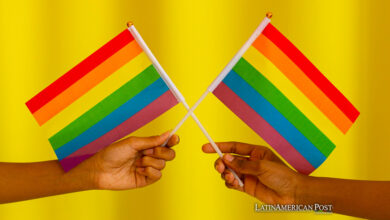Women Mexican Catholics Redefine Faith by Embracing Choice and LGBTQ+ Rights
In Mexico City, a group of Catholic activists challenges traditional norms, intertwining their faith with advocacy for abortion rights and LGBTQ+ support, reshaping religious perspectives.

Photo: Unsplash
The Latin American Post Staff
Escucha este artículo
Leer en español: Las mujeres católicas mexicanas redefinen la fe adoptando la elección y los derechos LGBTQ+
Catholics for the Right to Decide in Mexico City
In the bustling heart of Mexico City, a unique fusion of faith and activism thrives within the offices of Catholics for the Right to Decide. Here, an image of the Virgin Mary sits alongside a green scarf bearing a powerful message: "Mary was consulted to be the mother of God." This symbolizes the group's commitment to intertwining devout Catholicism with staunch support for abortion access and LGBTQ+ rights.
Founded in 1994, following the model of Catholics for Choice in the United States, this organization has become a beacon of progressive Catholicism in Latin America. Operating in 10 countries, its members challenge the traditional invisibility of women in religious contexts, advocating for a feminist reinterpretation of sacred texts.
Redefining Motherhood: A Provocative Stance in Mexico
Central to their belief is the notion that the Virgin Mary actively chose motherhood rather than merely acquiescing to divine command. This stance is exceptionally provocative in Mexico, a nation where conservative groups often don blue garments to protest abortion decriminalization. The Catholic Church, led by figures like Archbishop Carlos Aguiar Retes of Mexico City, remains vocally anti-abortion, often mobilizing religious symbolism in their activism.
Recognizing the emotional and spiritual turmoil many women face in these circumstances, Catholics for the Right to Decide established a spiritual accompaniment group. This team, comprising theologians and faith leaders from various Christian denominations, offers support to women grappling with the moral complexities of abortion.
Women reach out through phone calls or social media, seeking guidance during or after an abortion, or when overwhelmed by guilt and existential questions about sin and damnation. The organization maintains confidentiality, using these interactions to refine its approach and deepen its understanding of the societal context.
This spiritual support involves re-examining biblical texts and engaging in meditations and healing rituals to alleviate guilt and remorse. Through this process, women are guided towards reconciling their faith with their choices.
Beyond the Spiritual Realm: Engaging in Public Discourse
Beyond this spiritual support, Catholics for the Right to Decide actively engage in public discourse. They conduct university lectures, offer training to medical professionals who may resist performing legal abortions due to personal beliefs, and produce "Catolicadas," an animated series exploring religious themes.
The impact of their work resonates beyond the confines of their organization. Personal testimonies attest to the profound effect of their approach. One LGBTQ+ individual found solace and self-acceptance through their reinterpretation of the Bible. At the same time, a woman, post-abortion, expressed finding peace and reconnection with her faith, able to partake in communion and sleep soundly after years of turmoil.
Also read: Mexico's Search for 'Missing' Reveals Flawed System
Catholics for the Right to Decide represent a pivotal shift in the landscape of religious activism in Latin America. Their work is not just about advocating for rights but redefining the relationship between faith, personal choice, and social justice. They stand as a testament to the possibility of a compassionate, inclusive Catholicism that embraces choice and diversity while maintaining a deep devotion to its spiritual roots. This group's journey is a beacon for many, illuminating a path where faith and rights coexist harmoniously, offering a new perspective on what it means to be a Catholic in the modern world.

